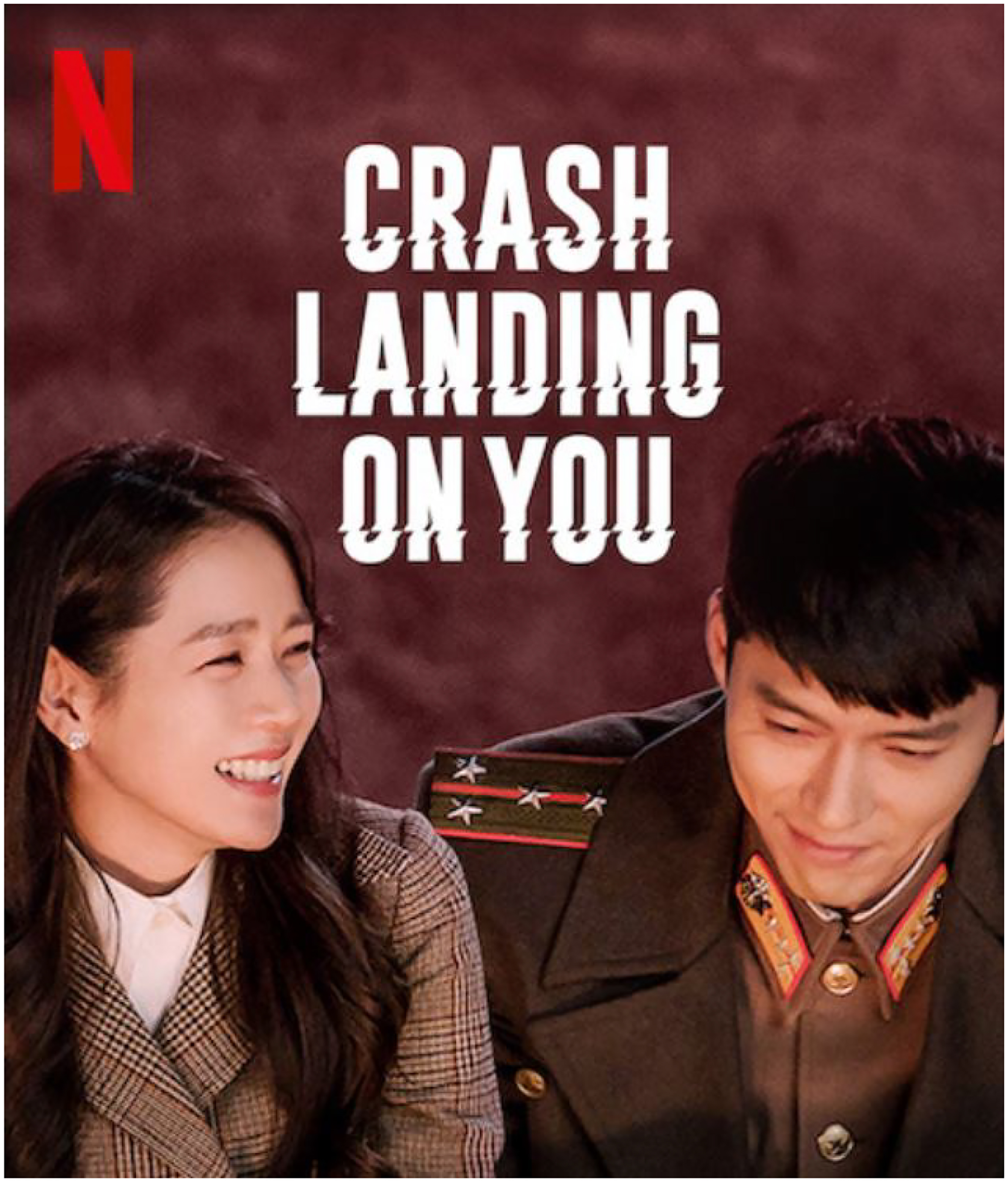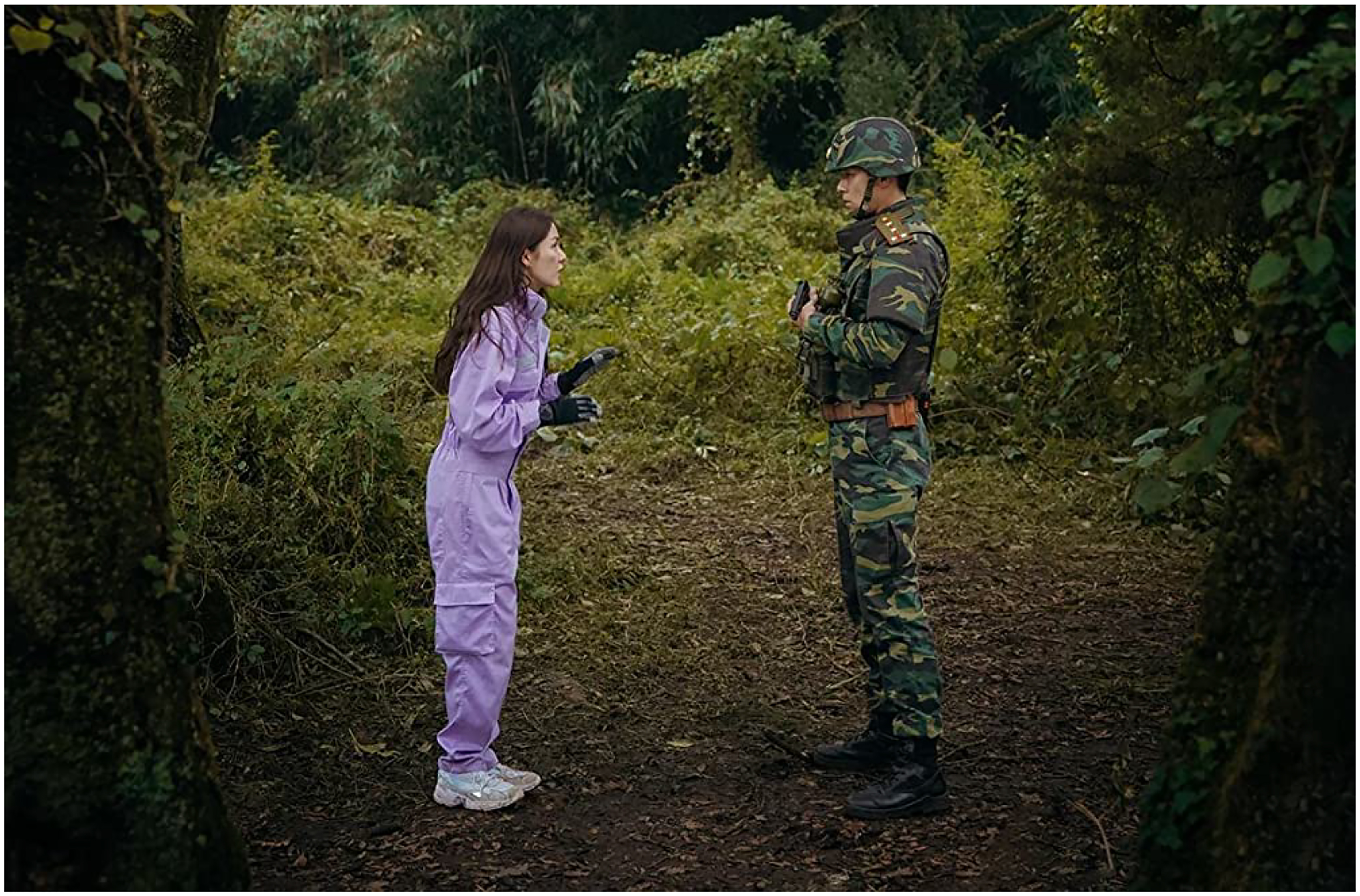One on the numerous South Korean romantic-dramedies available on Netflix, Crash Landing on You (henceforth Crash Landing ) is a 16-episode series that aired on pay network tvN from 2019–2020. The series finale became the highest-rated drama in tvN’s broadcast history.1
Crash Landing also garnered considerable critical attention for its representation of North Korea. This was very much connected to the current political climate, as Stephen Epstein and Christopher K. Green suggested:
“Development of Crash Landing appears to have begun in earnest in 2018 amidst an atmosphere of highly favorable public opinion about the government’s approach towards the North…The almost unprecedented optimism about relations with its neighbor…played a role in encouraging a drama with North Korean settings and an attitude of sympathy towards many of its northern characters. Unfortunately, this propitious climate did not last, and in 2019 South Korea’s relationship with North Korea experienced a major downturn; the usual state of tensions has returned before the show has a chance to crash land on anyone’s screen.”2
The female protagonist in Crash Landing is an extremely wealthy South Korean businesswoman and chaebol heiress Yoon Se-ri (Son Ye-jin). One day while paragliding Se-ri is caught in a powerful tornado: “My gosh…why is that tractor flying in the wind…why is that happening?!”3 She inadvertently lands in North Korea and encounters Ri Jeong-hyeok (Hyun Bin), a North Korean military officer. Rather than turn her over to the North Korean government for possible trial and imprisonment, Jeong-hyeok hides Se-ri in the North Korean military base as they attempt to devise a plan to smuggle her back to South Korea and, of course, they fall in love in the process.4
For the sake of brevity, this discussion will eschew the numerous narrative twists and the multiple subplots – which veer from comic misadventure to melodramatic tragedy – in order to focus on the representation of the romantic couple as a signifier of one nation (Korea) long-divided into two nation-states: North Korea (Jeong-hyeok/Soviet communism) and South Korea (Se-ri/Western capitalism). Sandra A. Son noted:
“The inter-Korean division as a great tragedy and the unnatural situation on the peninsula is a theme that runs strongly through Crash Landing on You’s storyline. The love between the northerner and southerner, seemingly destined to reunite but kept apart by arbitrary forces beyond their control, mirrors the bitter narrative of the two Koreas, which has spanned more than 70 years…Despite the soft-focus romanticism of the political situation, Crash Landing on You brings the pain of the division to a personal level for a generation of Koreans who, unlike their parents, have no memory of what it was like to be a single nation.”5
Separate Lives, Separate Nations
It bears stressing that “nations” are body-politic united by common culture, ethnicity, language, and territory as opposed to “states” as the governmental apparatus that houses nations. In this respect, the idea that North Korea and South Korea are not simply two states but two nations is manifest in the opening title sequence which begins all episodes of Crash Landing. It underscores that Se-ri and Jeong-hyeok are always-already “separated” as two different Koreas. They are depicted in associative montages of separate shots, such as Jeong-hyeok walking down the street of a fairly monochrome village in his military uniform looking at his watch cutting to a shot of Se-ri walking down the street of a cosmopolitan city in plaid blue suit with an orange tie; they are also presented in split-screen images within the same shot, such as Jeong-hyeok in his uniform driving a military vehicle and Se-ri on the right being chauffeured in the back seat of a luxury car working on a tablet. They occasionally “crossover” into each other’s split-screen “territory” but do not acknowledge each other’s presence until final shot of the opening titles where they are shown together, tentatively looking at each other, as the split-screen borderline dissolves.
In this respect, the “unification” of Se-ri and Jeong-hyeok is tenuous. By the final episode it appears Se-ri and Jeong-hyeok did not “break up” by choice but rather they are “broken up” by the myriad cultural, economic, political, and social pressures of North Korea-South Korea divide. Se-ri decides to start a scholarship foundation in Switzerland for low-income children from around the world in order to groom them into potential classical musicians. Their talents will be showcased by the foundation with two weeks of annual performances. At the narrative level, this is motivated by Se-ri’s hope that Jeong-hyeok – a piano prodigy who abandoned music for a career in the military – will one day rendezvous with her in Switzerland: a nation-state historically synonymous with “neutrality.”
The arc-narrative comes full circle when Se-ri is paragliding in the Alps and when she lands Jeong-hyeok is standing mere feet from her. They embrace and kiss but the key moment of the unification in public rather than private takes place in a banquet hall where a pianist is playing Debussy’s “Claire de lune.” Jeong-hyeok walks in and sits next to Se-ri. Se-ri whispers “He just started” to which Jeong-hyeok answers, “I know.” They are shown is close-up but separate shots until, following a pan across the banquet hall, a close-up shot from behind depicts the couple discretely holding hands under the table, out of view of the other people in the banquet hall but not the Crash Landing viewer.
In the documentary The Pervert’s Guide to Ideology, Slavoj Žižek discusses Beethoven’s Ninth Symphony (“Ode to Joy”) as a cultural text that has “universal adaptability” and variously mobilized by Nazi Germany, the Soviet Union, the People’s Republic of China, the far-right in Apartheid-era Rhodesia (now Zimbabwe), the Maoist Shining Path revolutionary movement in Peru, the Olympics, and as the official anthem of the European Union.6 In this regard, Sandra A. Son observed, “Academic scholarship on the prospects for future unification of the two Koreas has warned of the threat to North-South reconciliation posed by the sheer threat of the socio-historical divide, which would take much more than a political agreement to overcome.”7 In Crash Landing a unification of the two Koreas represented by Jeong-hyeok and Se-ri is facilitated by the “universal adaptability” of European high-culture (classical music) under the auspice of global capitalism.8
“Sigriswil”
The scene shifts from the banquet hall to a villa in the Alps with Debussy fading out and fading into a longer version of the opening title them “Sigriswil,” a K-Pop ballad that takes its title from the area in Switzerland that Se-ri and Jeong-hyeok have established for their annual rendezvous. While the opening title is sung in Korean, the rendition that ends the final episode of Crash Landing is sung in English save for the middle section. Ultimately, while unification of two Koreas seems to be an impossibility, in the Western world of culture, geographic space, and above all money Se-ri and Jong-hyeok can live in occasional peaceful coexistence.
Notes
- Dong Sun-hwa, “21.7: Crash Landing on You Sets Record for tvN Drama,” The Korea Times (February 14, 2020). Archieved at 21.7%: ‘Crash Landing on You’ sets record for tvN drama - The Korea Times; accessed on August 19, 2022. ⮭
- Stephen Epstein and Christopher K. Green, “Crash Landing on You and North Korea: Representation and Reception in the Age of K-Drama, The Asia-Pacific Journal/Japan Focus (June 5, 2020: Volume 18, Number 12, Issue 5). Archieved at Crash Landing on You and North Korea: Representation and Reception in the Age of K-Drama | The Asia-Pacific Journal: Japan Focus (apjjf.org); accessed on August 17, 2022. ⮭
- The scene is a parody of The Wizard of Oz. ⮭
- In this respect, Crash Landing departs for the frequent “Rich man, poor woman” scenario in South Korean romantic-dramedies where a wealthy man, often a CEO of a corporation, and one of his employees fall in love; thereby the working-class woman not only finds true love but attains upward mobility (e.g. Clean with Passion for Now, My Secret Romance, My Shy Boss, Revolutionary Love, Strong Gil Boon-Soon, What’s Wrong with Secretary Kim). ⮭
- Sarah A. Son, “Crash Landing on You: Korean Drama Crosses the North-South Divide,” The Conversation (February 25, 2020). Archieved at: Crash Landing on You: Korean drama crosses the north-south divide (theconversation.com); accessed on August 17, 2022. ⮭
- The Perverts Guide to Ideology (2012, dir. Sophie Fiennes): 17:56–25:56. ⮭
- Crash Landing on You: Korean Drama Crosses the North-South Divide.” Emphasis added. Germany and Korean were divided two nation states as a result of Cold War politics following World War Two (East and West Germany, North and South Korea). The Korean War (1950–53) ended in a stalemate and the North-South Korean divide remained intact. While Germany was peaceably reunified into a single nation-state in 1990 following the dissolution of the Soviet Union, nation-states such as Czechoslovakia and Yugoslavia dissolved into smaller nation-states based on “nationhood” rather than Statism. ⮭
- As much as the English subtitles, There are several points over Crash Landing’s duration in which Korean subtitles appear while to reflect the difference in the dialect of North Koreans and South Koreans, which is to say that even though the speak a similar language is it’s not a unified language. In contract, late in the final episode it is revealed that Se-ri speaks fluent English and therefore part of the Western world. ⮭



